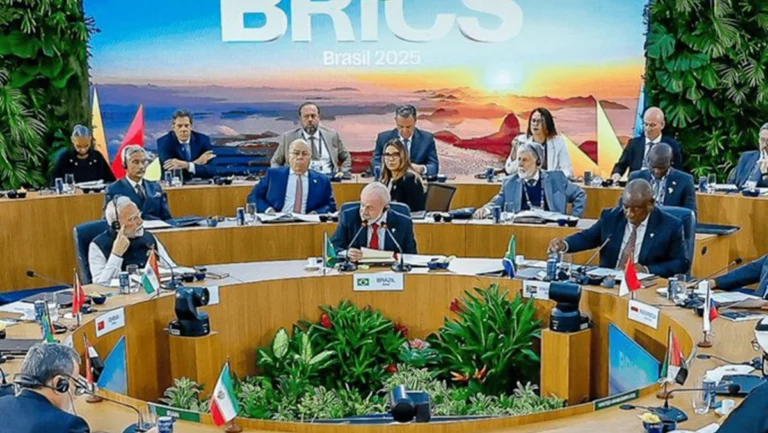BRICS Countries Approve Principles for Global AI Governance at Rio de Janeiro Summit

BRICS summit in Rio de Janeiro, July, 2025. X/ @olhardigital
July 8, 2025 Hour: 11:19 am
Their declaration reflects the Global South’s vision for this strategic technology.
At a summit held in Rio de Janeiro, BRICS member countries approved a declaration outlining principles for the global governance of artificial intelligence.
RELATED:
Mexico Proposes BRICS Allocate 1% of Military Spending to Development Fund
Leaders from Brazil, Russia, India, China, South Africa, Egypt, the United Arab Emirates, Ethiopia, Iran and Indonesia, along with partner states such as Bolivia, Vietnam and Cuba, discussed the transformative potential of AI and the need for ethical and inclusive regulations.
The declaration, which reflects the Global South’s vision for this strategic technology, includes 10 governance principles detailed below:
The text reads, “Science and Technology in BRICS: Minister Luciana Santos spoke about one of the cooperation axes that appears at the 17th BRICS Summit: promotion of industrial innovation and access, governance and mastery of artificial intelligence in its various faces.”
Innovation and Sustainability: AI should promote advancements in productivity and quality of life, with a focus on sustainable development.
Inclusive International Governance: The BRICS nations support a global framework led by the United Nations that respects national sovereignty and prioritizes the needs of countries in the Global South.
Ethical and Non-Military Use: BRICS members advocate for the responsible development of AI, in alignment with national laws and international standards.
Technological Sovereignty: Each country should set its own regulations, protect data and strengthen its digital economy.
Equitable Access: Data governance must be fair, secure and inclusive, ensuring equitable access to AI for developing nations.
Open Science: BRICS members support accessible international models and standards, including the removal of barriers for smaller economies.
Public Services: AI should support digital infrastructure, healthcare, education and environmental protection, while helping to reduce inequality.
Labor Rights and Education: The technology should respect decent work standards and be integrated into education, with an emphasis on digital literacy and critical thinking.
Inclusive Systems: AI systems must be transparent, free from bias, human-supervised and respectful of cultural diversity. Security and Regulation: AI development must prioritize safety, prevent malicious uses and be based on global collaboration for responsible regulation.
teleSUR/ JF
Sources: BRICS – Venezuela News






